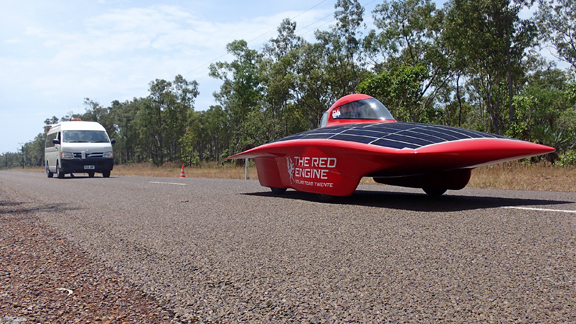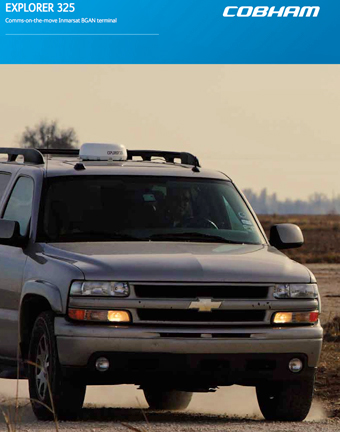Solar Team Twente’s ‘The Red Engine’ vehicle covered the 3,021km course across the wild terrain of the Australian Outback at an average speed of 79.67 km/h, completing the race in a total time of 37 hours 38 minutes.

Solar Team Twente’s ‘The Red Engine’ in Darwin.
Throughout the race, the Inmarsat-sponsored team from the Netherlands benefited from having on-board mobile broadband connectivity provided through four Cobham Satcom EXPLORER 325 BGAN terminals. The devices supplied Team Twente’s race leader with critical metrological data gathered by the scout vehicles that travelled ahead of ‘The Red Engine’. The team’s scout cars were also equipped with Inmarsat’s BGAN service, enabling them to access data from anywhere in the world and to connect to other support vehicles, which could be separated by several hundred kilometres.
 These factors combined to help the team adjust their race strategy to achieve maximum performance during the race. The Cobham Satcom EXPLORER 325 BGAN terminals also enabled Team Twente to share information via social media. Friends, family and fans of the race, worldwide, were able to enjoy the excitement of the race through regular social media updates, including photos and videos.
These factors combined to help the team adjust their race strategy to achieve maximum performance during the race. The Cobham Satcom EXPLORER 325 BGAN terminals also enabled Team Twente to share information via social media. Friends, family and fans of the race, worldwide, were able to enjoy the excitement of the race through regular social media updates, including photos and videos.
In addition to the crucial weather telemetry, the team gathered a broad range of information, including potential hazards along the route, road conditions, and environmental data, all of which helped to enhance the performance of the vehicle. All the information gathered was then used to map the best course for ‘The Red Engine’.
The support team, which travelled alongside the race car in a convoy of scout vehicles, a Decision Making Unit (DMU) vehicle and a media car, were equipped with BGAN terminals. Compact and lightweight, the vehicular BGAN terminal provides immediate access to Inmarsat’s global satellite-based broadband network. The race team benefited from continual, real-time reports on any shifting weather patterns and road conditions that may affect the race car’s performance. Inmarsat has also provided the team with three IsatPhone Pro satellite phones for use in case of emergency.
The World Solar Challenge is a biennial, solar-powered car race, which covers 3,021 km (1,877 miles) through the heart of the Australian ‘outback’, from Darwin to Adelaide.


